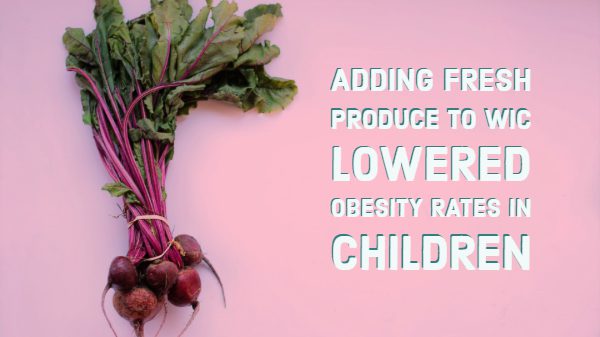It was a long and hard battle for fresh produce advocates, but a new study suggests efforts to increase fruit and vegetable access for WIC paid off in lower rates of obesity for children.
A study published April 1 by the American Academy of Pediatrics found an association between the 2009 changes to the U.S. Supplemental Nutrition Program for Women Infants, and Children (WIC) food package reduced obesity among children ages 2- to 4-years-old.
The changes included less juice, milk and eggs and cash vouchers for purchasing fresh produce.
Study authors found the prevalence of obesity in WIC participants in the age group were increasing by 0.23 percentage points prior to 2009. After the WIC package revision, the trend was reversed, -0.34 percentage points per year.
“This is absolutely exciting news,” said Mollie Van Lieu, Senior Director for Nutrition Policy at the United Fresh Produce Association, Washington, D.C.
It’s also good timing, Van Lieu said.
“We’re going into child nutrition reauthorization this year, and this will provide an opportunity to talk about the benefits of WIC and the importance of increasing the fruit and vegetable voucher,” she said.
The voucher program helped shift the mindset for WIC participants, said Kathy Means, Vice President of Demand Creation and Consumer Affairs for the Produce Marketing Association, Newark, DE.
“Changing environments is important,” Means said. “In this case it’s availability in the retail environment in terms of what moms can choose to spend their WIC vouchers on.”
There’s still work to be done in getting participants to take full advantage of the program, Means said.
“We know from WIC data that moms are not always using the full value of their fruit/vegetable vouchers – so that’s one place to start,” she said. “It’s a win-win-win for retailers, moms, and kids when moms do spend the full voucher wherever it’s accepted.”
New dietary guidelines suggest even more funds dedicated to fresh produce vouchers, Van Lieu said, with some proposals suggesting $12 per month for children and up to $35 per month for mothers.
Reaching more children at a younger age will only pay off in the long run, Means said.
“Changing the trajectory of childhood obesity at this early age is critical as it starts kids off right, introduces them to foods that will benefit them all their lives, and has amazing impacts down the road,” she said. “When we start kids right, we don’t have to turn them around when they are 16 or 60.”
“And, for our industry, this means creating produce consumers for life.”



